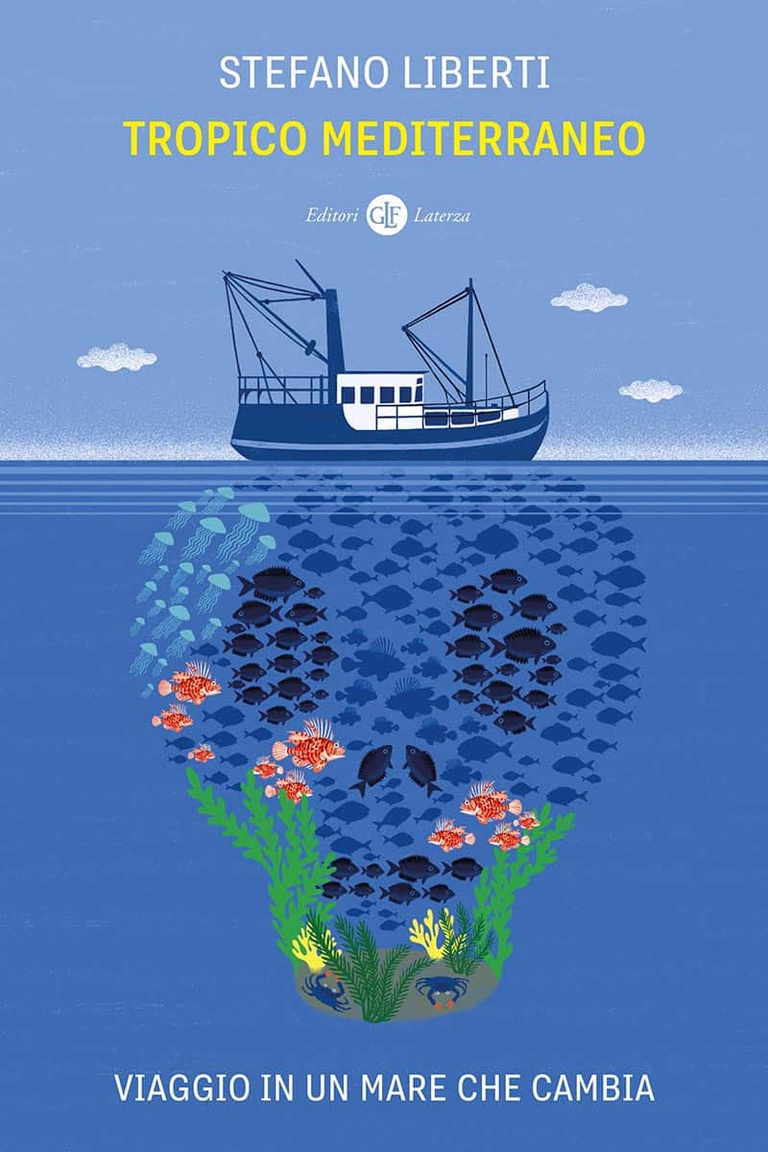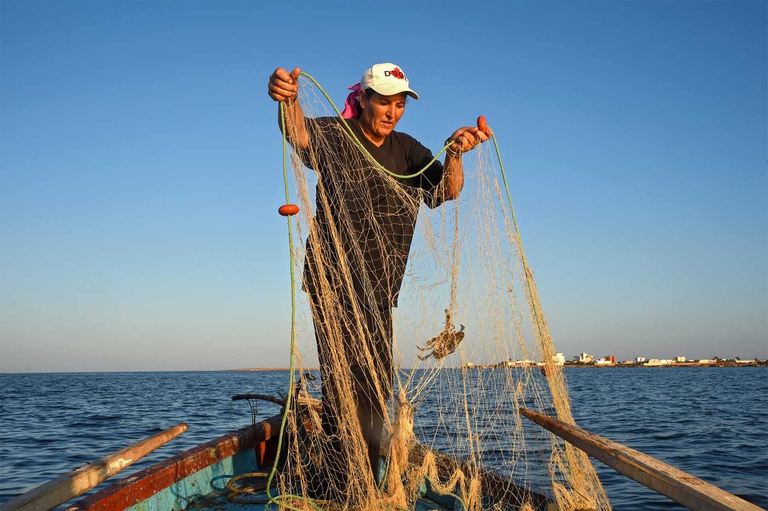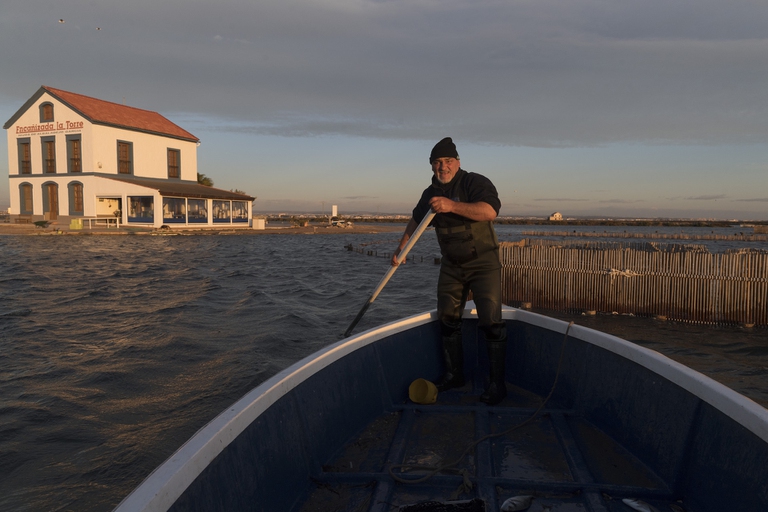https://www.lifegate.it/stefano-liberti-tropico-mediterraneo
- |
There are the scientific data, and they are incontrovertible.They tell us that the Mediterranean Sea it is a climate hotspot that is warming twenty times faster than the oceans, which affects the circulation of currents and flora and fauna (the blue crab it's there invasive alien species that we have all learned to know by now, but it is certainly not the only one).Then there are jobs like those of Stefano Liberti, journalist and writer who searches for the meaning of those scientific data in the stories and voices of those who experience the consequences firsthand. Mediterranean tropic, his latest book published by Laterza, is a journey into what we once called Mare nostrum, but which we were the ones who irreversibly transfigured.The people encountered in the stages of this journey, from Gibraltar to Cyprus, from the Kerkennah islands in Tunisia to the Po delta, they describe their daily reality with harsh, sometimes disillusioned words.But, against the light, we glimpse the opportunity to work together to give a future to our sea.Inevitably different, but still one future.We talked about it with the author.

The blue crab, from problem to resource for the Kerkennah Islands
Among the places that Stefano Liberti mentions most often during our conversation are the Kerkennah Islands, in southern Tunisia.Cliffs that emerge from a Mediterranean Sea that seems to encompass them and which therefore, although at different latitudes, recall the Pacific atolls that risk disappearing For the rise of sea levels.The Kerkennah have always been considered as a nursery where bream, mullet, grouper, octopus, clams, shrimp and scampi reproduce.So much so that a fishing system called sharfiya:everyone has the right to their own plot of sea, where they leave their nets to be emptied twice a day.But not in the summer quarter, because fish stocks need it to regenerate.
“The incredible thing is that that ancestral fishing method, which allowed the livelihood of generations and generations, no longer works today,” explains Liberti.It doesn't work anymore because the waters are too warm, pollution has destroyed them prairies of Posidonia oceanica and therefore what the local fishermen call has free reign daesh, better known to us as blue crab, which makes a clean sweep of all the other species.“The fishermen were the first to see these changes and be affected by them,” says Liberti.To the point that they end up making do as best they can, even abandoning artisanal fishing to dedicate themselves to fishing I drag along the coast (the so-called kiss). An illegal method, because the nets scrape the seabed and tear up the posidonia.It's a vicious circle:there are too few fish so, in order to survive, aggressive techniques are resorted to which further impoverish the sea.

The two big themes:alliance and respect for the limits of nature
It obviously can't work that way.“But the moment there was a government strategy in which biologists, scientists and fishermen went in search of a solution, encouraging national and international investments and providing subsidies, then a supply chain exploitation of the blue crab, with processing plants that also export it abroad", underlines Liberti.“Not all fishermen are happy about it, but some are.There are those who sold the boat and bought it back.Indeed, they themselves are asking to introduce periods of biological closure, because the blue crab is a resource that must not end."In short, “it is human to try to minimize problems that overwhelm us, as also happens with the climate crisis.But collective action can change things."
The other great theme, together with that of the alliance, is the limit.“The Mediterranean Sea is subject to the climate crisis which accelerates other contextual crises,” the author points out.Crises linked to the indiscriminate exploitation of natural resources, pollution, the collapse of ecosystems.“Pushing some boundaries created a perfect storm,” he continues.“Fishermen are by definition environmental sentinels, but they have found themselves scraping the bottom of the barrel, destroying their own resources.The moment they are supported, they can accept the restrictions and even ask for new ones, because they realize they benefit more from it.So yes, they return to introjecting the concept of limit."An example of sustainable management, described as "brilliant", is that of Pomo pit, Croatia:the only area of absolute restriction of fishing which really works, also because fishermen have every interest in ensuring that it is respected, given that the surrounding areas become much more fishy and profitable.
Of course, it is not so trivial to achieve a similar result.“Politics must bring together stakeholders and make compromises.They are long processes;the Pomo pit took years.But the participatory process works more than the imposition of objectives from above", comments Liberti.“What I saw, traveling around the Mediterranean basin, is one inattention of politics towards the sea.We ourselves see it as something distant, even though we live on a peninsula.This government has established a Ministry of the Sea, and has done well, and has published a plan for the sea which, however, I find too unbalanced towards the exploitation of resources:rare earths, hydrocarbons, fish stocks.But we can no longer afford to extract resources from a sea that is poor in them:we must change our approach by listening to those who experience the sea, such as biologists and fishermen".

A prism through which to read the future of the Mediterranean:the Mar Menor
But there is a place that, perhaps more than any other, embodies both the problems of our sea and the possible solutions.And, paradoxically, in geographical terms it is not even part of the Mediterranean Sea.We're talking about Mar Menor, the largest salt lagoon in Europe.It is located in Spain, in the region of Murcia, and is divided from the sea by a long, narrow strip of land called La Manga.This ecosystem was the subject of a real collapse in 2016, due to the proliferation of ainvasive algae which transformed the water into a smelly green concoction, causing thousands of fish and shellfish to die of asphyxiation.A phenomenon that is not the result of chance, far from it.He was unleashed in a territory that was simultaneously plundered by the building speculation and fromagriculture, both developed without rules or brakes.
But, just when rock bottom was reached, something clicked.A massive civil mobilization, whose symbol is the evocative human chain of 70 thousand people who joined hands in 2021 on the banks covered in dead fish.It was precisely a popular initiative that led to the Spanish parliament granted the Mar Menor the legal personality:a case that was the first in Europe and is also due to the dedication of Teresa Vicente, awarded the Global environmental prize in 2024.
“Here you can see the future of the Mediterranean Sea:either it will collapse, or we will be able to decide, as a community, that its protection matters more than intensive exploitation", comments Stefano Liberti.“The communities I saw around the Mediterranean are very sectoral, while there there was an enormous civil inspiration”.Hence the choice to keep this story for the end of the volume.“My goal is not to present the issue in catastrophic terms, because catastrophism immobilizes”, concludes Liberti.“Obviously the water will not cool down and the invasive species will not go away, but we can still implement adaptation strategies, because the sea regenerates quickly.I tried to talk about the lights of hope, because they can push for collective civil action."
